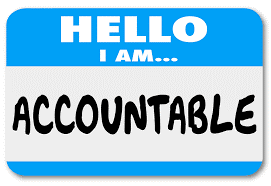 There’s something about being told what to do that evokes those parental voices we all rebel against. As a younger man, I would bristle when someone told me what to do or even gave input on what I was doing.
There’s something about being told what to do that evokes those parental voices we all rebel against. As a younger man, I would bristle when someone told me what to do or even gave input on what I was doing.
It’s like I couldn’t help myself. Later in life, I bought into that adage, “there is wisdom in counsel,” even though I would still tighten up when advice and accountability came my way.
Why is it we struggle with accountability when there’s so much wisdom around us? Wisdom will get us what we want and need, if we just listen and allow input into our lives. I think it’s a wound we all carry.
I’ve found that there’s a correlation between how insecure a person is and their inability to take counsel, criticism, and correction – or even to be checked on. (Tweet it!)
The higher the insecurity, the more the person rejects accountability.
Someone reading this might ask: “why are you getting into all this personal analysis and looking into childhood behavior, etc.? Isn’t the major gifts thing just about doing the right planning and moves?”
No, it isn’t. On the front end, it’s about planning, goal setting, and strategy. But it’s also about structuring what you do in a disciplined way, and then maintaining the will actually to do it.
In our work, Jeff and I and our colleagues regularly encounter resistance to accountability. It’s the single most frequent reason a MGO fails at their job – they don’t stick to the good plan they wrote. And when they depart from that plan, they resist being held accountable to get back on course.
I could produce pages and pages of real-life situations where MGOs and managers let accountability slide in their major gift work. And the most often cited reasons are “I really don’t think it’s needed” or “I just don’t have the time to do it” or “there was something more important I needed to do.” So the MGO resists expending the effort required to get back on track with what he or she knows needs to be done.
If you’re reading this, and you’re “off-plan” with any of your caseload donors, stop and ask yourself – “why am I?” Maybe it’s because you don’t value the plan you’ve written for your donors, or something else has grabbed your attention. Or someone (like your manager or accountability partner) has told you that you need to get back on track, and you’re resisting that call to accountability.
If that is happening, don’t let your ego and those voices govern what you should do. Instead, remember that there is nothing more important in your job than to be working the plan you’ve written – and then exercising discipline to stay on track with what you know you should be doing.
Richard
Search Blog Posts




I can always relay on Veritus to shine a light on the path forward!
You never let me down – providing framework, tools and a pathway to move ahead.
I cover the west half of the US and the state I live in which includes our capital city. I have 150+ prospects. in 17 major cities + some small towns. I am busy cultivating, asking, following up on asks and self-educating myself on best practices of philanthropy and planned giving in-between. Oh, I forgot to mention all the campus meetings and that we are in a silent phase of a campaign. I also have almost double the workload of other colleges as I with the College of Business. I have a highly professional sales background and get the need for plans for each donor. My question to you is when would you suggest the best time in my schedule to do this – possibly in my sleep? We all want to follow a best practices approach – but what about a common sense approach. I would really enjoy a piece of software (besides Millennium) that I could organize all my prospects; asks; follow-ups and estate gifts asks outstanding. There can be so much more to help gift officers in this area. Any thoughts? I really do enjoy your information and do appreciate that the information you provide is not academic but from practical experience. I just know from my previous sales life that everyone makes a plan but no one follows it. Also, there are only so many hours in the day. I can’t squeeze any more into my day so something would have to go – but I honestly don’t know what it would be. I already work through my lunch hours!
Hi, Elaine. Thanks for writing. I have several reflections to your good comments. First, I am assuming that all of your 150 donors are qualified. If not, there is a lot of time wasted just in that area. Secondly, you have the + sign after the 150. I would get rid of that. Limit yourself to 150 qualified donors. Next tier those donors A, B and C so that you skinny the list down to a manageable few who require more attention than the others. That will also save a lot of time. Then, get out of any campus meeting, or any other meeting, that does not have to specifically do with your donors. Not necessary. Lastly, I disagree that everyone makes a plan but no one follows it. All of the MGOs we manage make plans and they all follow them which is why they are successful. So, make a plan for each qualified donor on your caseload. Then, follow it. It will save you time in the long run. We know from years of experience that if a MGO has 150 qualified donors and has a plan to manage each of them there are enough hours in the day to do that and still have a life. And this – all of it – IS a common sense approach.